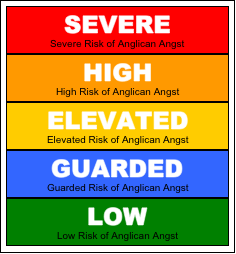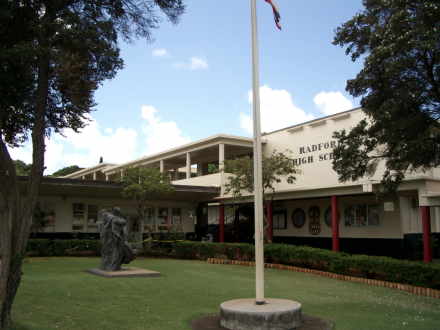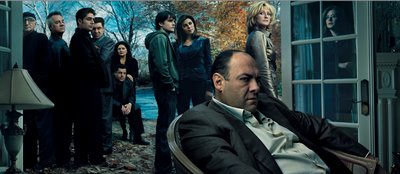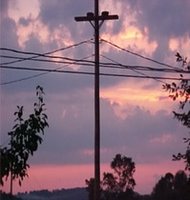
The Rt. Rev'd Bob Duncan, Moderator of the Anglican Communion Network and Bishop of The Diocese of Pittsburgh, received an honory doctorate from the Episcopal seminary, Nashotah House. Here is the text of his speech. Stay tuned for comment. (PS Thanks Peter for catching the typo!!).
The Future of Anglicanism
An Address for Convocation Nashotah House 25th October, A.D. 2006
The Rt. Revd. Robert William Duncan, D.D. Bishop of Pittsburgh Moderator of the Anglican Communion Network
O God of unchangeable power and eternal light: Look favorably upon thine whole Church, that wonderful and sacred mystery; by the effectual working of thy providence, carry out in tranquility the plan of thy salvation; let the whole world see and know that things that were cast down are being raised up, and that things that had grown old are being made new, and that all things are being brought to their perfection by Him through whom all things were made, even Jesus Christ thy Son our Lord; who liveth and reigneth with Thee, in the unity of the Holy Ghost, ever one God, world without end. Amen.
I have been asked to speak about the future of Anglicanism. I gladly do so on this happy occasion and in this historic Chapel, a Chapel that has become very dear to me, and to countless others, whose spiritual lives have been profoundly shaped by its devotions and whose missionary and pastoral commitments have been fed by the heroes and heroines whose ministries founded and sustained this House and rightly earned it its simple nickname: “The Mission.”
As I begin let me say how deeply honored I am by the Board’s action in granting me the Doctor of Divinity degree (honoris causa), and how greatly honored I am by this company’s presence here today. To become a “Son of the House” – to join so many other sons and daughters whose friendships have come to mean so much to me – is gift and encouragement of the first order. For the parish church that formed me, and especially the Anglo-Catholic priests who did their best to teach me through all those early years, this is their honor too. For Nara, whom I met in that parish church and who has stood by me all the years since we were teenagers – especially through these last supremely challenging years – this honor is also profoundly her honor. For the great Diocese of Pittsburgh that it has been our privilege to serve as Bishop and Lady through this last decade, and for the extraordinary comrades with which I have been surrounded in the emergence of the Anglican Communion Network, for the clergy and people and staff that have supported me and freed me to be at the center of the work of Reformation in our day, this honor also belongs to them.
The Three Choices on which All Else Hangs
Just a year ago, some three thousand Anglicans gathered at Pittsburgh for the Hope and A Future Conference. Many who are here today were there in those days. They were thrilling days in which we modeled what we wanted to become. They were days of worship, days of teaching, days of challenge, days of fellowship, days of reconciliation and days of hope. They were exhausting days.
As the Hope and a Future Conference began, I spoke about three encouragements, three warnings and three choices. In beginning this address about the future of Anglicanism I want to say again what I said at that time concerning the three choices that are before us, choices that are profoundly personal and profoundly corporate and on which do hang the future of Anglicanism. Everything else I shall have to say depends on the bedrock – or the quicksand – of the “day in and day out” of these choices individually and institutionally made, choices which together will “add up” to Anglicanism sustained or Anglicanism failed.
I said these words to the multitude assembled for Hope and A Future:
“The first choice is for Truth over accommodation. For everyone in this hall we are continuing to deal with choosing Jesus first: Jesus above culture, Jesus above comfort, Jesus above property, Jesus above family and friends, Jesus above any other security, Jesus above a wayward North American Church. We are here to confirm our choice for Truth above accommodation. This is the evangelical choice.”
“The second choice is for Accountability over autonomy. There are lots of fragments in this hall: fragments of congregations, fragments of dioceses, fragments of denomination. Freedom, like Truth, is a passion that all of us share. But the vast danger here is that we will get stuck in our freedom Forty years of Anglican splits and splinters tells the story only too well. Autonomy is every bit as much a danger as accommodation. We are here to make a choice for Accountability over autonomy. This is the catholic choice.”
“The third choice is for the Mission over sullen inaction. Is your congregation a church-planting congregation? Is your congregation partnered with a Global South diocese? Is your congregation functioning in local needs-based evangelism? Are you personally engaged in a Matthew 25 ministry? Have you personally led anyone else to saving faith in Jesus Christ? Have you challenged those around you to “Choose This Day?” Are you trapped in “ain’t it awful?” or “what can we possibly do?” or the escape of self-absorption? We are Holy Spirit people: people who have been gifted, “charismed.” We are here to elect Mission over sullen inaction. This is the charismatic choice.”
That was one year ago. Nothing has altered the centrality of these choices. How our choices add up – our choices for or against Truth, Accountability, and Mission – will ultimately determine the future of Anglicanism. What I shall go on to say in this address concerns matters of lesser importance, matters concerning which it is good for us to think, propose and build, yet matters that can never rise above the level of the penultimate. I raise these lesser considerations about the future of Anglicanism with the understanding that it is the “three great choices” that are ultimately the significant ones. And if I speak somewhat more provocatively today than is normally my custom, my hearers will also understand that this is, after all, an academic convocation.
Can Anglicanism Survive At All?
Reflecting thirty years ago, in the Epilogue to the fourth edition of Anglicanism, Bishop Stephen Neill, then nearly eighty years old, wrote these words:
“The Anglican Communion, being a living entity and not an ossified institution, never abides in one stay, and is in a condition of perpetual change. This means that any description of its situation at a given moment will be out of date before it appears in print; the most that can be hoped for is an analysis of trends and an indication of the direction in which developments seem to be moving.”
Bishop Neill continued:
“The first and burning question is, naturally, whether the Anglican Communion in anything like its present form can survive at all.” (1)
For Stephen Neill, the question of the future of Anglicanism had been raised by a range of developments that surely meant that deep change was ahead: the appearance of the United Churches of first South (1947) and then North (1970) India, the diminution of the metro-political role of the Archbishop of Canterbury in the emergence of separate national Provinces, the independence those Provinces sometimes exercised, the creation of the Anglican Consultative Council, the blossoming of the charismatic movement, the abandonment of Communion-wide formularies (especially Prayer Book and Articles) and the extraordinary strains introduced by fundamental theological questioning and the ordination of women.
In 1976, Bishop Neill did not go on to answer the question he had raised. Thirty years on, what I am prepared to say at this moment in time is that the Anglican Communion cannot survive, let alone flourish, in its present form. It is in need of, and in the midst of, profound reformation. It is not alone in this – for the whole Church in the West is in need of this reformation – but our subject, for today, is Anglicanism, and it is to some of the aspects of this reformation that I now turn.
A Mediated Settlement in the United States
There are two churches claiming to be the Episcopal Church. In the words of Bp. Ed Salmon, Chairman of the Board of this House, there is a “chasm fixed between them.” Eight dioceses (2) have gone so far as to appeal to the Communion for Alternative Primatial Oversight (APO), whereby a bishop or archbishop external to the States would exercise all the functions of Presiding Bishop within the States. Three dioceses have withdrawn their consent for inclusion in their domestic provinces and one has proposed complete re-alignment with an overseas jurisdiction. (3) The Archbishop of Canterbury has intervened by asking the Secretary General of the Anglican Communion, Can. Kenneth Kearon, to seek an “American solution” to the conflict represented by the APO requests. Significantly, the four principals identified by the Archbishop of Canterbury for the Kearon initiative, were the Presiding Bishop, the Presiding Bishop-elect, the Bishop of Pittsburgh and the Bishop of Fort Worth, all seated as equals, naming equal teams. Unable to achieve any resolution on the Alternative Primatial Oversight issue at a September meeting in New York, and aware that the issue is actually the “chasm” between us rather than APO, significantly many of the participants present at New York believe that the Kearon initiative has no future, thus insuring that in fact it has none.
Speaking together from Kigali, just one week after the New York meeting, twenty Primates of the Global South (or their representatives) communicated their intention to provide Alternative Primatial Oversight, in consultation with the Archbishop of Canterbury, to the appealing U.S. dioceses. (4) Representatives of the Global South Committee will be meeting with representatives of the eight APO dioceses within a very few days.
Also in September, twenty-one diocesans (ten of whom are Network diocesans) met at the invitation of the senior diocesan of the Episcopal Church, Bp. Don Wimberly, the Bishop of Texas, to declare that the response of the General Convention to the Windsor Report was substantially inadequate, that the Windsor Report was the only hope of a way forward for the Anglican Communion, and that they (we) were committed to going forward together on that basis.
But the situation is very much more than Network or Windsor dioceses. Progressive and moderate dioceses are at different stages of disintegration. Diocesan budgets are in shambles in many places, and membership and average Sunday attendance continue to decline, as congregations split or the faithful choose non-ECUSA Anglicanism or Rome, Orthodoxy, Pentecostalism or Evangelicalism. In some parts of the country, orthodox congregations are in “mutual defense pacts,” or are quietly negotiating “ways out” where there is a liberal openness to such conversations. Where generally conservative dioceses suffer, it is because the bishop is perceived to be compromising or unable to stand clearly enough for his clearest clergy and lay leaders. Conservative church-plants are emerging everywhere. Often they are on no one’s radar for months. Eventually they identify themselves to the Network’s church-plant trainer, or to the Network’s international “transfers desk.” Not atypical is this situation, reported to me just last week: In addition to the nine congregations under Ugandan or Bolivian oversight in Southern California, there are now eight new Anglican congregations forming there who are, as yet, related to no one. Additionally, the Canterbury Trail has not cooled at all on evangelical campuses across the nation – indeed the trail grows more like a highway – despite (or might it be because of?) the troubles. That both Gordon-Conwell and Fuller Seminaries, each located in strongholds of the other Episcopal Church, have established “Anglican tracks” in the last year are significant signs of the times.
We have reached the moment where a mediation to achieve disengagement is the only way forward. I believe that the other Episcopal Church – the one not represented in this convocation – has finally also come to that conclusion, as well. I believe that a mediated settlement will be in place by this time next year, or that the principals will be well on their way to such a settlement. How can we set one another free to proclaim the gospel (the Truth) as we, so differently, understand it? How can we bless one another as cousins, rather than oppress one another as brothers? The day for a serious and wide-ranging mediation has arrived. This will have an immense impact on the present and the future of Anglicanism, and it cannot come too soon.
An End to Western Hegemony
In his landmark book, The Next Christendom (5), Penn State Professor Philip Jenkins described the decline of European and North American Christianity and the emergence of a dynamic and rapidly-expanding Christianity in the Global South. Anglicanism in Africa, Asia and South America, along with Pentecostalism and Roman Catholicism, is at the center of this “next Christendom.” Nigeria alone, with double the number of Anglicans of just fifteen years ago, and one-quarter of all the world’s Anglicans today, will consecrate another eighteen missionary bishops this January.
But the Anglican tune, and the call for the dance, have long come from London or New York. The systems that govern the Anglican Communion are Western. The Anglican Communion Office is chiefly funded by American money. The Anglican Consultative Council has been dominated by British and American interests, and operates on the First World’s paradigm of parliamentary rules and procedures. Or compare the anachronism of a “first among equals” chosen only from among British citizens and named by a secular Head of State. How peacefully, how cooperatively these systems change will determine much about the future of Anglicanism: Will the old systems be metamorphosed for a new day, or will the old systems be supplanted by new ones that emerge from the events of these days?
For a conciliar tradition, which is what Anglicanism most nearly is at its provincial level, what, we must ask, is the Council at the international level that will come to guide it? The once-in-a-decade Lambeth Conferences may have functioned in that way in a more settled age, but are inadequate for 21st century Anglicanism. Can the Primates Meeting, or some smaller Council drawn from that membership, serve this purpose? And what of the radical imbalances between Provinces when comparing the Primates of Scotland, Ireland, Wales or even the United States with Provinces like Nigeria, Uganda or Kenya?
The future of Anglicanism depends on the shift of its systems and institutions from North to South, and from Anglo- to Afro-, Sino- and Latino-. In some measure an early sign of the shift in leadership may have been signaled from Kigali in September. Alternative Primatial Oversight may not be something that Western leaders see any way to provide, but Southern leaders believe they can. Just as old paradigm responses to the present Anglican crisis – responses like the Panel of Reference – pale in comparison to the vigorous and more immediate interventions in our domestic life of Provinces like Central Africa, Kenya, Southern Cone, Uganda, and, in the first wave, Rwanda and Southeast Asia. What will the Instruments of Unity of this shift look like? We cannot yet say, but shifting they are, and shift they must. Stephen Neill was able to pose the central question. My hunch is that he would have been astounded at the depth of the changes that the maturing and renewal of Anglicanism, if it be God’s will, now requires.
One last consideration as we look at the necessary end to the Western hegemony in Anglicanism: Covenant is an idea with a very old and non-Western pedigree. How an Anglican Covenant emerges will be fascinating to observe. Already the West – not least in Archbishop Rowan Williams’ “The Challenge and Hope of Being an Anglican” – has proposed degrees of Covenant commitment. Whether the Windsor Report-proposed or Global South-introduced notion of an Anglican Covenant will be meaningful or meaningless will depend on whether Global South clarity or Western post-modernism define what is and what is not Anglicanism. The future of Anglicanism as a coherent Christian enterprise or remnant of a syncretistic Enlightment development will hang in the balance. What must also be observed, in any case, is that the emergence of two Anglicanisms – like the two Episcopal Churches of the present moment – one a declining and ultimately heterodox expression and one a chiefly Southern Hemisphere offspring with totally new Instruments of Unity still to emerge is, sadly, far from a remote possibility.
Recovery of an Anglican Magisterium
Whether Global Anglicanism can survive the entropic forces at play within our life together is a question of monumental historical and ecumenical significance. For all of us in this Chapel, the question is also one of great personal significance.
An Anglicanism without Scripture as its fundamental authority cannot survive. Richard Hooker rightly saw Scripture’s primacy. Reason guides the application of Scripture’s message for any age. Tradition elucidates Scripture’s meaning as previous generations have applied it. But Scripture is the ultimate authority in its plain meaning.
In his bleak assessment of the survivability of Anglicanism, the English Dominican Aidan Nichols, quoting Eric Maschall, speaks of the “fundamental incoherence” of the three historic streams of Anglicanism: Evangelical, Catholic and Liberal. (6) Summarizing the arguments Nichols brings to bear in this analysis, Graham Leonard, former Bishop of London and former Anglican, cites four factors that have substantially (terminally?) diminished Anglicanism’s ability to hold these parties and the whole tradition in creative tension: 1) an undermining of the ultimate authority of Scripture (as symbolized by the loss of place of the Articles of Religion, 2) the loss of the Book of Common Prayer, 3) the innovation of the ordination of women, and 4) the substitution of the authority of national synods for the authority previously accorded Scripture. (7)
To points 1) and 4) the experience of the American Church reveals all too starkly the pattern in contemporary Anglicanism that cannot be a part of our future, if there is to be a future. In 1973, the General Convention of the Episcopal Church, allowing pastoral concern to trump Scriptural teaching, replaced its annulment canon with a canon allowing remarriage after divorce, not limiting such remarriage to those cases that might be argued from Scripture. By comparison to effects visited on the whole Church in the undermining of Scriptural authority in life after life and household after household, the confirmation of a bishop in a same-sex relationship in 2003 is but reasonable follow-on. Part of Anglicanism’s magisterium was its fundamental submission to the theological and moral teachings of Scripture, especially when that teaching was personally costly, (8) all the while offering the grace that forever met sinners where they were. To each one in this room I ask, are we prepared together to recover this submission, or no? In Scripture’s plain words, are we prepared to remain faithful to the wife of our youth, or no? (9) The future of Anglicanism is fundamentally dependent on submission of this sort, on submissions that break our own desires against Scripture’s narrow way. And not just in theory, but in my life and in yours.
To point 3) – the ordination of women – I do not wish to speak, which you will regard as this address’s one avoidance. My own support for women in holy orders is well known. Global Anglicanism has said that there are, in fact “two integrities” here, both arguable from Holy Scripture, and – to employ Hooker’s method — less so from Tradition. I am convinced that an honest century of reception will sort this one out. I am also persuaded that our God has challenged us to deal with this issue, either because He does intend to bless this new understanding or because He has it in mind that we Anglicans will best find ourselves again in the institutional and relational charity it will require of us as a dynamic and faithful Anglicanism re-emerges.
To point 2) – the loss of the Book of Common Prayer – I want to be so bold as to suggest the following: that Anglicanism’s practical magisterium – its reliable teaching authority — has been its Book of Common Prayer, and that without a restored Book of Common Prayer, reasserting the theological propositions of medieval Catholicism as reshaped by the English Reformation, best represented in the prayer book of 1662, Anglicanism will continue its theological disintegration apace. For that Western Church whose popular and practical believing was more nearly lex orandi, lex credendi than any other tradition — for that Western Church whose practical magisterium was its prayerbook — a fixed prayer book is essential. For a tradition that has a separate magisterium, Vatican II-style liturgy is a possibility. For us as Anglicans, it is, quite demonstrably, not. Forty years of alternative texts and expansive language have produced an undiscipled people and a theological wasteland. We have become a Church that actually does believe, in the words of one eucharistic canon, that we are “worthy to stand before [Him].” (10) How staggeringly un-Scriptural and un-Anglican!
What I would also add to this is that the need for an “Authorized Version” of the Bible, at least parish by parish, or diocese by diocese, re-emerges alongside the need for a Book of Common Prayer. How shall we ever learn Scripture again except that we always hear it in the same way? The matter of formation needs to dominate our liturgical and ascetical thinking, rather than our desires for education, variety, correctness or newness. And since I have already given quite enough offense, I shall leave off here without arguing for hymnody that is static enough to produce texts that are known by heart…
A Church without a magisterium is soon no Church at all. It is not too late to begin the reform, but the time is short. The reform will also not come from the top – as much as we might yearn for such a solution (for Reformations do not come from the top or begin at the center) – but from a thousand altars, like the one at the heart of this House, and from leaders brave enough to embrace unpopular and counter-cultural truths. The future of Anglicanism is most assuredly tied up in this. The Choice for Comprehensiveness over Balkanization
Diocesan boundaries are lost forever, at least in the United States. Resistance by American progressives to early suggestions of ways to accommodate conservatives in progressive dioceses (as well as progressives in conservative dioceses) (11) have led to situations in which multiple Anglican jurisdictions now operate in the same territory. Prior to the Singapore consecrations of January 2000, there were, of course, multiple Continuing Church and Reformed Episcopal Church jurisdictions operating within what were Episcopal Church dioceses. But between 2001 and 2006, multiple Anglican Communion jurisdictions have come to operate in the same domestic spheres. Rwanda, Uganda, Central Africa, Kenya, Southern Cone and Nigeria all have significant congregations within U.S. dioceses, and more join them daily. Other presences from the Diocese of London to the Province of Korea are less well documented. The embrace of affinity relationships, rather than geographical location, as the organizing principle of the Anglican Mission in America, has also offered an intentional alternative to classic assumptions about diocesan structure. Things will never return to the simplicity of one Anglican bishop having authority over one Anglican territory. What was lost by the whole of Western Christendom at the Reformation of the 16th Century has now been lost by Anglicanism in the Reformation of the 21st Century.
The danger in what is taking place is immense. The competitive denominationalism that characterized the Christian Church for most of the last five centuries could as easily come to characterize intra-Anglican relationships, particularly in North America. But North American rivalries and conflicts are soon enough transported to the rest of the Anglican world. The Anglican Communion Network has striven to avoid this outcome, but whether its labors will finally succeed is still to be played out.
Can we limit our love affair with freedom? Can we choose – both clergy and congregations – the common good over more self-interested opportunity? The sorrows of having a bishop five thousand miles away (limiting episcopal ministry) may be found to be outweighed by the joys of having a bishop five thousand miles away (limiting episcopal accountability.) The independence of being the only one of our kind anywhere nearby may prove seductive when compared to the hassle of regional expectations for joint mission when there are several connected congregations. The temptations of American “assessments” flowing into the treasuries of economically-challenged Global South dioceses or provinces is also a factor militating against a quick end to Anglicanism’s increasing Balkanization. The late Paul Moore of New York used to be fond of describing the Episcopal Church as “a catholic church in love with freedom.” The longer we embrace our freedoms, the less catholic we shall prove to be. Whether we shall permanently live in Anglican silos labeled AMiA or Kenya or Anglican Province in America or Windsor or fill-in-the-blank remains to be seen. Will we choose the common good when push comes to shove? The future of Anglicanism will depend on our answer, both individually and corporately. Forty years of domestic Balkanization among conservative Anglicans point to the tremendous change of heart that must overtake us.
Holiness and Sacrificial Leadership
Among the clergy of the Diocese of Pittsburgh are a great many of my personal heroes and heroines. They work for less than they could earn in another diocese. They work among the poor and socially battered locally, or cross-culturally around the world. Many work at less than clergy minimums and have under-funded pensions. Some have gathered extended communities, with students and those willing to risk downward social mobility drawn into their vision of the gospel enfleshed. Among our rectors are also those who stay the years it takes to become the rector, loving the people in such a way that they endure for the long-haul, still creative, still leading, always aware that they turned down “greener fields” in sacrifice to the people God continued to call them to serve. We have young clergy and older clergy and their families willing to take on very difficult assignments, risking (and sometimes achieving) failure because the Lord, the people and the Bishop have asked it. We have the faculty of Trinity School who serve untenured and most under-compensated of all the Episcopal seminaries, in a noble experiment in a decayed industrial town.
Contrast this sacrificial leadership with the vision of secular professionalism that drove clergy values during the last half of the twentieth century. That vision did many things, but rarely did it increase holiness or make of the parish priest an icon through which the people glimpsed God’s kingdom breaking in.
The theme of this past summer’s Network Council, “A Reformation of Behavior,” speaks of the repentance and re-direction required for the counter-cultural movement that a renewed Anglicanism must become. Harkening back to the definition of evangelism offered by Archbishop William Temple so long ago, our people and our congregations must so present Jesus Christ, in the power of the Holy Spirit, that people are drawn to accept Him as their Savior and to submit to Him as their Lord. (12)
Jesus honors those who take up their cross and follow him. For American Anglicans in this day, that means being willing to bear considerable personal suffering and uncertainty. It means shepherding sheep in the midst of a church war whose outcome is not known, in the midst of an Anglicanism that may have run its historic course. It means forgiving church leaders, especially bishops, who have utterly failed us and who continue to fail us. But Jesus has put into our charge what he has put into our charge, and the issue is whether we will lay down our lives for those sheep. For priesthood that looks like Jesus’ priesthood, someone else’s failure in his or her stewardship does not give us license to abandon our own, no matter how painful, no matter how lonely. Jesus’ stewardship on the cross, is the stewardship God is asking of us in this Reformation time, this hinge of history. More than any other thing, the future of Anglicanism, like the future of the whole Christian Church, depends on Jesus’ cross and on ours. (And if this does not sound very “modern” or very “Rite-II,” it is not supposed to.) Are we not with Shakespeare’s Henry V at our own Agincourt? Yet the stakes are even greater, the battle fiercer, the casualties no less painful, and the outcome surely to be spoken of for ages, however we shall elect to play our individual and our corporate part.
God’s Sovereignty and the Future of Anglicanism
In human terms, I have attempted to describe what I believe are among the key elements that will determine Anglicanism’s future. Prof. Lamen Sanneh of Yale University, Islamic-born West African who converted to Anglican Christianity in his youth, assesses Anglicanism as that Christian tradition best-positioned and best-suited to global evangelization in the 21st century, and especially so in the ever-deepening confrontation with Islam. Lamen Sanneh also recognizes the extreme vulnerability of Anglicanism to the destructive forces threatening to undo that Anglicanism. (13)
Whether our God shall choose to use Anglicanism as a key to the Reformation He is bringing to His One Holy Catholic and Apostolic Church, or a sign of the judgment that comes upon a branch of that Church that has lost, through its sin and infidelity and arrogance, His favor, we cannot yet say.
I am prepared to hope for the former and sacrifice for the former, with hands and head and heart joined with thousands of Anglican leaders across this land and around this globe, knowing that I have not been released from God’s call to me to guard the sheep entrusted to my care. I am prepared to believe Paul’s words at the end of his First Letter to the Corinthians, and to take at face value God’s promise in God’s Word offered there:
Be steadfast, immovable, always abounding in the work of the Lord, knowing that in the Lord your labor is not in vain. (I Cor. 15:58)
This is what Anglicans do. It is why I believe there is a future beyond this excruciatingly difficult present. Moreover, I have come to trust a God who creates out of nothing, raises the dead, and loves the likes of us. That He could do something with Anglicanism, if we will entrust ourselves to Him, is not really that hard to believe. And whatever He does, we may rest in the security of knowing that in Him our labor will not have been in vain.
Footnotes:
1 Neill, Stephen, Anglicanism, Fourth Edition, Oxford University Press, New York, 1977, p.388.
2 Central Florida, Dallas, Fort Worth, Pittsburgh, Quincy, San Joaquin, South Carolina, and Springfield have appealed for Alternative Primatial Oversight or Relationship. The Bishop of Dallas has withdrawn from the request, but the Bishops of Albany are considering joining the request.
3 Fort Worth, Pittsburgh and Springfield. Under Article VII of the Constitution of the Episcopal Church. San Joaquin is considering complete Provincial re-alignment.
4 Communique, Global South Primates, Kigali, 22 September 2006.
5 Jenkins, Philip, The Next Christendom, Oxford University Press, New York, 2002.
6 Nichols, Aidan, The Panther and the Hind, T&T Clark, Edinburgh, 1993, p.176.
7 Ibid., pp.xi-xii.
8 Here we might reference countless martyrs from the Oxford Martyrs to the Martyrs of Uganda.
9 Malachi 2:13–16.
10 Book of Common Prayer, 1979, p. 368.
11 The most notable of these proposals was the “Jubilee Initiative” proposed by American Anglican Council Bishops in January, 2000.
12 “To evangelize is so to present Jesus Christ in the power of the Holy Spirit, that men shall come to put their trust in God through Him, to accept Him as their Savior, and to serve Him as their King in the fellowship of His Church.”
13 Private conversations hosted at St. Vincent Archabbey, Latrobe, Pennsylvania, 2005.
 Since it appears that Beers still has his head and it's not rolling down I-95 (at least we haven't heard that he has been sacked) and that in The Letter he threatens "Should your diocese decline to take that step, the Presiding Bishop will have to consider what sort of action she must take in order to bring your diocese into compliance" he is indeed speaking for the Presiding Bishop-Elect, Katharine Jefforts Schori. If this is not so, his head would have rolled by now.
Since it appears that Beers still has his head and it's not rolling down I-95 (at least we haven't heard that he has been sacked) and that in The Letter he threatens "Should your diocese decline to take that step, the Presiding Bishop will have to consider what sort of action she must take in order to bring your diocese into compliance" he is indeed speaking for the Presiding Bishop-Elect, Katharine Jefforts Schori. If this is not so, his head would have rolled by now. 




















